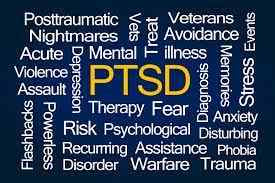First of all, what is Post Traumatic Stress Disorder?
After a traumatic event, our brains sometimes change. This can cause symptoms of Post Traumatic Stress Disorder. Most people will experience symptoms of Post Traumatic Stress Disorder for up to 4 weeks after a traumatic event. However, some may experience symptoms for longer. This is when medical/psychiatric intervention is required to help relieve symptoms.
 |
| Post Traumatic Stress Disorder Treatments |
What counts as a ‘traumatic’ event?
A traumatic event could be anything – the most obvious being on a battlefield. However, it could also be losing a parent from a young age, caring for someone when they’re extremely ill until death, being in a car crash, losing somebody to suicide, or abuse at any age. There are many potential causes of Post Traumatic Stress Disorder. This is why Post Traumatic Stress Disorder treatment should be tailored to individuals.
What are the symptoms of PTSD?
For Post Traumatic Stress Disorder treatment to continue to improve, there has to be an understanding of the symptoms. Symptoms of PTSD include emotional dysregulation, mood swings, trembling, palpitations, nightmares, flashbacks, avoidance behaviours, dissociation and more. These symptoms can be extremely difficult to live with for the sufferer, but also for those close to the person suffering.
What is Post Traumatic Stress Disorder
Treatment?
Post traumatic stress disorder treatment comes in a few forms. When diagnosed with PTSD symptoms, it is likely talking therapies may be offered. One example would be cognitive behavioural therapy (CBT). This can be helpful to those who might avoid certain situations because of the trauma that they experienced. It can help them to change their way of thinking in those situations and rationalise them more easily. For some, CBT might not be enough. EMDR (Eye-Movement Desensitisation and Reprocessing) can be another option for sufferers of PTSD. Although this is a form of Post Traumatic Stress Disorder treatment that is still being explored, it has proven to be very effective so far. It has been extensively researched, and what makes it different to other more conventional therapies is that the main focus of it is to help heal the brain. This is because trauma actually alters the brain.
How does EMDR work?
After a traumatic experience, the brain starts a recovery process. The hippocampus, which deals with memory and learning, communicates with the prefrontal cortex and the amygdala (these deal with behaviour and stress signals). Sometimes the recovery process takes longer, especially if a person is still distressed by the event that occurred. EMDR helps this recovery process to continue so that it can eventually be resolved. Although I’m referring to EMDR as a Post Traumatic Stress Disorder treatment, it can also be used for phobias, eating disorders, sleep disturbance, depression, and many other mental health problems.
How long does EMDR take?
Most people need fewer EMDR sessions for Post Traumatic Stress Disorder treatment than other forms of psychotherapy. This means it can be quite a popular choice.
What about medication for Post Traumatic
Stress Disorder Treatment?
Sometimes, medication is prescribed as a
form of treatment. Usually the medicine would be a selective serotonin reuptake
inhibitor – this is a modern anti-depressant, also known as an SSRI. These are
known to have fewer side effects than older anti-depressants.


